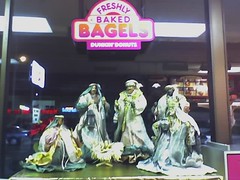Witold Rybczynski's slideshow essayThere's a scene in
Thus Spoke Zarathustra in which the title character comes upon some houses and wonders if "men" really come and go from those houses. "They look to me as if made for silken dolls," he says (Don't worry, I'm not going to go off on a Nietzschean tear on a fucking weblog). And that's what gets into the back of my mind and bothers me about Celebration. I'm not so much suspicious of the idea of a micro-planned neighborhoood; just of the specific way it makes you feel.
Celebration, in all its little ways, inspires as much meekness as it does pride. You can never just be in Celebration and appreciate Celebration; you have to be constantly reminded of the specific fact that you are in Celebration. Note the little sign in the park in slide 4. It's a nice park but is not allowed to speak for itself. Those devious little labels and signs with their poorly chosen colors are everywhere. This is a neighborhood that aims not only to be enjoyable, but also to continually sell itself. The "brand" is everywhere; you are not allowed to forget it.
Personally, I can't image living there and having much self-respect. It would cramp my style. It would cramp any style worthy of the name.
Keep in mind: This is a neighborhood where homeowners must sign a series of "Covenants," which establish very strictly what they can't do with their lawns and houses. Not "agreements." Not just the usual bureaucratic crap one takes care of when closing on a house, then forgets.
Covenants. And they do adhere, with an appropriate religiousness.
Architecture critic Rybczynski's essay comes down critical yet evenhanded. He ends up relying on a distinction between "populist" and "elitist" that doesn't apply very clearly in a middle-class neighborhood, even an expensive one.
He says the streets are "artfully planned to create a sense of place." I'd have to disagree with that. In fact, for anyone remotely used to a city grid or the whole "cardinal directions" thing, it creates confusion and disorientation. It's very easy to get completely lost within Celebration, and that leaves you nowhere but in Celebration. Stranded with the brand. The cardinal directions won't help you find a way back to the highway, because the streets are so jumbled and circuitous. You'll have to forget about simple directional sense and take those insane routes on their own terms.
Rybczynski is right in saying that the neighborhood can be a nice-looking place to walk around in, but the complications would discourage walking too far from one's home. Hell, maybe wandering violates a COVENANT!
Because of its history, Florida lacks a long-standing sense of place for permanent residents. Central Florida was fairly dead for a long time; now it's scrambling to accomodate unprecedented numbers of people. Aside from rural settlers, the area once had "permanent" residents before. They were called Indians and we killed them. People come and go out here. For now, the sense of place has to be made up on the spot, not in that kinky gradual way. It is as ready-made as sense of place can be, not the ever-changing, ever-corrupting sense of place that brings true character to a city.
I like that Rybczynski is willing to critique the architecture rather than throwing feces at it. I especially agree with him on the bank in slide 7. But is the bank claimed for the city, with "CELEBRATION" in those big letters, or is its architecture subjugated to the "brand"? Though eccentric, and elegantly out-of-place, it can't escape those quaint, overscrubbed, neuterish lampposts and street signs. And it's those nuances—which make up the context for all these individual buildings—that I wish this essay called into question. Aren't they just a little meekening?
Oh, and what the fuck is the word "kerfuffle"? If that word should be applied to any kind of conflict at all, it should be reserved for, say, pillowfights among clowns.

